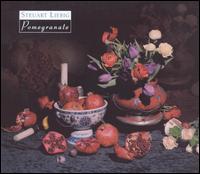

 Steuart Liebig, Pomegranate liner notes
Steuart Liebig, Pomegranate liner notes
Invitational Investigations
by Josef Woodard
What we have here is music that heeds an ancient cultural calling, with contemporary means. It pits protagonist-soloist against, and in collusion with, ensemble forces, mixes up improvisatory impulses with elaborate compositional gridworks. Stylistically, the canvas stretches beyond the frame to be inclusive, and thwarts pat, easy descriptors.
Nothing new/Everything new, as it happened.
Pomegranate is what happened when bassist-composer-bandleader Steuart Liebig took on his most ambitious project to date, creating music that suggests, by turns, avant-little-big-band thinking and blissfully anarchic chamber ensemble inventions. As raucous and free-ranging as much of this music might be, a sense of balance, on different levels, is critical to its aesthetic success. And balance, in the case of art this multi-directional, isn’t something arrived at either casually or mathematically (i.e. “three parts score to two parts improv…”). It’s a more intuitive, unpredictable courting of not necessarily-related elements: risky business, but exciting when it works. And it does.
Said balance extends to the choice, and textural diversity, of soloists: from New York came the distinctive French horn player Tom Varner and bassist Mark Dresser, and from Los Angeles, reed player Vinny Golia and guitarist Nels Cline. For this potent foursome, Liebig constructed separate musician-specific, concerto-like vehicles for each soloist, with plenty of free space within his structural framework
Each of the pieces—named after lines from Rilke poetry--has a discrete identity, but interesting and sometimes surprising cross-references arise between them. On Dresser’s piece, “the motionless clue of fallen skies,” the finely-articulated timbral nuances delivered via his signature arco technique relates, on some level, to the sawtoothy slink and painterly effects of Cline’s electric guitaring, on “the darkness of each endless fall.” On another front, Golia’s eloquent and extra-jazz reed fury somehow aligns with Varner’s jazz-chamber sensibility, on “widening circles reach across the world.”
Those soloists’ work unfolds over materials that might suggest Mingus meeting Stravinsky’s “L’Histoire du Soldat” in a bad seed 12-tone-row. Yes, styles do slither around in this music. Bop lines creep into the language on Varner’s piece, and alt-rock energies pleasantly invade Cline’s space, but only in fleeting passages. The proper listening mode here is to listen with ears wide open, and admire the flow rather than isolate the reference points.
For the record, Liebig is happy to cop to the Stravinsky-esque tag: “There have been a lot of people in the 20th century who I’ve tried to steal from. Stravinsky is one. Actually, there’s my faux Webern in Dresser’s piece. Take the theme and have it broken up between four instruments, and then have the retrograde broken up between three or four instruments, and then have them play simultaneously.”
As it happens, Golia’s piece, “flare up like flame and create dark shadows,” relates back to a central origin of the project. Liebig first got an inkling of ambition to undertake such a work when he heard ten years earlier, when he heard Golia’s own venturesome Large Ensemble. As for inspiration, Liebig also points to the work of musicians like Franz Kogelman and Simon Fell, who, like Golia, have delved into the liberating gray zones between uncharted and scored sounds.
Liebig has been contemplating, and circulating around, this vortex for many years. He is one of those rare bold souls who has settled on the electric bass, specifically the expanded range of the 6-string, as an instrument both deserving greater respect—and greater investigation. “I don’t think many people have done it, so it seems ripe for exploration. It seems like most guys playing electric bass are doing more fusion-type things.” He figures that his exploratory spirit comes from “listening to guys like Dresser, who makes the bow do so many things. I don’t have a bow, so I have to resort to other tactics.”
A glance at Liebig’s resume finds an early stint working with soul-jazzer Les McCann, work with the late, great Julius Hemphill, and also with the rock band BLOC, which had an album on A&M in 1991. In the midst of a life in music, Liebig studied theory and composition, and double bass.
But, in a sense, one could say that his active creative life began anew when he got involved in a vital Los Angeles new music scene, playing with the family of free-thinking, idiom-blurring musicians that included multi-reedman Golia, the brothers Cline (Nels and drummer brother Alex), guitarist G.E. Stinson, drummer Billy Mintz, and many others. There were albums in the ‘90s with Liebig’s Quartetto Stig on Golia’s Nine Winds label, in which compact versions of his improv-wrapped-in-structure experimentation can be heard via core members violinist Jeff Gauthier, trumpeter John Fumo (both of whom are featured on Pomegranate).
To hear Liebig tell it, on this project, “I was trying to make sure I wrote enough, but didn’t write too much. What I try to do is to write thematic material and then, instead of having development section like you’d have in a regular classical piece, I have the improvs as the development section. Then I’ll have thematic material going through some of that, so that there’s some forward motion, and you still have the thematic material driving the piece forward or just something so that there’s some structure in the chaos.
“I’m pretty much into trying to juxtapose control vs. freedom at this point. That’s my general concept of how I’m trying to write with an improvising band. Then I also veer into what I call the Mahler-ian thing--his whole idea that the symphony should reflect the world and include everything. I’m trying to include a lot of different things that interest me. In other words, I don’t really try to be very exclusive, in terms of saying `oh, I can’t do that.’ I’m more interested in the challenge of `how do I work that in and will it work, musically?’”
On Pomegranate, conceived, composed, conducted and performed on by Liebig, he experienced a new level of work-intensive preparations, but with commensurate increase of artistic rewards on the other side. Liebig confirms, “there were the most logistic issues to deal with and the longest forms, consistently. The whole nine yards. It was a kind of apotheosis. And the problem is that I ended up really liking the fact that I had the resources, so I want to do more. It’s an addictive thing.”
--Josef Woodard, April 2001